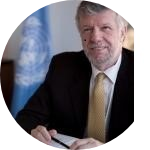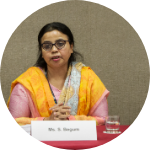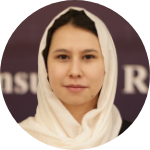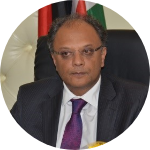The conference will bring together governments, social partners, academia, youth and civil society organizations, private sector, foundations, regional and multilateral organizations, and many more partners to:
1. Stimulate innovative thinking on job creation strategies that foster the rights and voices of young people.
2. Facilitate a dialogue and broker collaboration among participants.
3. Mobilize political will and resources to scale up investment and impact in youth employment.

 Collapse
Collapse
Antonio Aloisi
European University Institute, Bocconi University

Jennifer Brooks
Microsoft Philanthropies

Peter Wobst
Food and Agriculture Organization

Luc Christiaensen
World Bank

Marleen Dekker
INCLUDE

Rotimi Olawale
JR Coffee

Jürgen Menze
International Labour Organization

Vincent Huang
Tencent

Francesca Sbianchi
European Disability Forum

Charlotte O’Leary,
WHO Global Health Workforce Network Youth Hub

Maria Tussy
Fundación ONCE

Desmond Alugnoa
Major Group for Children and Youth

Kishore Gopal Reddy
Major Group for Children and Youth

Callie Ham
International Labour Organization

Peter Loewi
Major Group for Children and Youth

Ahmed Osman
International Council for Small Business

Tijmen Rooseboom
Ministry of Foreign Affairs, The Netherlands

Jiwon Park
Major Group for Children and Youth

Adriana Ciacaru
National Confederation of Free Trade Unions of Romania

Antonio Correa do Prado
Food and Agriculture Organization of the United Nations (FAO)

Luca Maestripieri
Italian Agency for Development Cooperation

Florencia Spangaro
Citi Foundation

Stephen Pursey

Gonzalo Gimenez Coloma
Spanish Ministry of Labour, Migration, and Social Security

Bilyana Georgieva-Voeva
Nestlé

Pedro Robledo
Injuvé Argentina

Nikita Sanaullah
European Youth Forum

Diah S. Saminarsih
World Health Organization (WHO)

Sangheon Lee
International Labour Organization

Paula Isturiz
Major Group for Children and Youth

Karen Moore
MasterCard Foundation

Jocelyn Formsma
National Association of Friendship Centres, Canada

Yon Fernandez de Larrinoa
FAO Indigenous Peoples Team

Nicholas Levintow
International Labour Organization

Yann Wyss
Nestlé

Shahida Begum
Save the Children

Angela Maria Herrera Puyana
International Labour Organization

Max Trejo
International Youth Organization for Ibero-America

Sania Haider
Major Group for Children and Youth, International Food Policy Research Institute

Dennis Kabutha
Mastercard Foundation Scholar

Gianni Rosas
International Labour Organization

Amadou Sako
saKom; Guinean Young Professional\'s Club; Conseil National du Patronat Guinéen (CNPG)

Azita Berar Awad
Global Labour Organization (GLO) and Graduate Institute of International and Development Studies

Ahmed Badr
Narratio

Kristeena Monteith
Talk Up Radio

Elena Gramano
Goethe Universität, Germany

Akustina Morni
International Organisation of Employers

Charu Bist
United Nations Development Programme

Ghadeer Khuffash
Education for Employment Foundation, Jordan

Omotolani Badara
Mastercard Foundation Scholar

Marjan Petreski
Partnership for Economic Policies, Canada

Gabriel Serber
McDonald’s

Sukti Dasgupta
International Labour Organization

Iqbal Hossain
United Nations Children\'s Fund (UNICEF)

Jacqueline Wamai
KUDHEIHA

Ann Mari Milo Lorentzen
Union of Education (UEN)

Salvatore Nigro
Education for Employment

Agnieszka Okroj
AIESEC

Joannie Marlene Bewa

Anders Aeroe
International Trade Centre

Martha Melesse
International Development Research Centre

Roxana Widmer-Iliescu,
International Telecommunications Union

Peter van Rooij
International Labour Organization

Susanna Pak
International Trade Centre

John Barrett Trew
Plan International

Shane Niall O\'Higgins
International Labour Organization

Lisa Corsetto
Abdul Latif Jameel Poverty Action Lab (J-PAL)

Elijah Mack-Stirling
National Association of Friendship Centres, Canada

Martha Imaculada de Araújo Efi
Timor-Leste

Nancy Taggart
USAID

Maria Teresa Gutierrez
International Labour Organization

Elizabeth Nouses
Namibian Employers Federation

Jiwon Pak
Major Group for Children and Youth

Domenico De Maio
National Youth Agency, Italy

Kevit Desai
Ministry of Education, Kenya

Carmen Menéndez
Public Employment Service, Spain

Christopher I. Morris
Asian Development Bank

Dorotea Zec
Legal Adviser
Tue, 28 May 2019 08:00 am To 21:00 pm
Loyola Auditorium
Session Summary
The opening session offered an opportunity for the host government and partners of Decent Jobs for Youth to introduce the major theme of the annual conference, i.e. Rights and Voices of Youth, and invite further collaboration that supports a rights-based approach in youth employment.
In 2012, the International Labour Conference adopted a resolution called “The youth employment crisis: A call for action”, which underlined the urgency for immediate and targeted interventions to boost productive employment and decent work among youth. The framework is based on a multi-pronged and balanced approach aiming to ensure equal treatment and equal rights (based on international labour standards) for young people at work. Similarly, the Call for Action invites youth employment investments that recognize young people as part of the solution, ensuring their voices are heard and amplified in dealing with the youth employment crisis.
In this context, the speakers stressed the importance of placing young people at the centre of the discussion through meaningful engagement that allows youth to actively participate in decision-making processes. They called for further attention on those youth groups which are particularly disadvantaged in the labour market – with a specific focus on young women and their rights, voices and representation. The speakers celebrated the work of Decent Jobs for Youth in advancing an inclusive and evidence-based agenda and urged conference participants to strengthen multi-stakeholder collaboration, as well as investments in both youth labour market supply and demand measures.
The session concluded with a video message by Mr Guy Ryder, ILO’s Director General, who encouraged partners to translate the guiding principles of Decent Jobs for Youth into action, commit to a rights-based approach and strengthen youth voices – including by increasing young people’s participation and voice in trade unions and employers’ organizations.
Speakers

Luca Maestripieri
Italian Agency for Development Cooperation

Florencia Spangaro
Citi Foundation

Gonzalo Gimenez Coloma
Spanish Ministry of Labour, Migration, and Social Security

Gianni Rosas
International Labour Organization

Antonio Correa do Prado
Food and Agriculture Organization of the United Nations (FAO)
Images
Videos
Testimonials
Loyola Auditorium
Session summary
Before taking on her role of Master of Ceremony, Ms Joannie Bewa, United Nations Young Leader for the Sustainable Development Goals, shared her experience as a young woman growing up in Benin and learning to confront the harsh realities of life. She spoke of the importance of self-recognition and the relevance of addressing raising gender inequalities in the labour market, healthcare and education. She described her entrepreneurial journey through the creation of the Young Beninese Leaders’ Association, set to amplify the voices and concerns of young women.
Ms Bewa stressed four key messages: (i) young people are the solution and need to be where the problem is; (ii) meaningful youth participation means going beyond speaking engagements and involving youth in decision making; (iii) synergize and strategize for success, by breaking siloes, recognizing weaknesses, and creating shared value; and (iv) take ‘no’ not as a rejection but as a new opportunity.
Conference participants shared their own struggles to get their voices heard and called for thinking outside the box to advance the Sustainable Development Goals.
Speakers

Joannie Marlene Bewa
Images
Videos
Testimonials
Loyola Auditorium
Session summary
The session featured two presentations on the rights-based approach guiding actions of Decent Jobs for Youth partners and youth aspirations in the world of work. The key takeaways are as follows:
Speakers

Stephen Pursey

Agnieszka Okroj
AIESEC

Joannie Marlene Bewa
Images
Videos
Reference links & documents
Testimonials
Ariosto Hall
Loyola Auditorium
Session summary
The session offered an opportunity to reflect on the structural trends impacting youth labour markets – from technological advancements to the impact of climate change – and highlight innovative efforts to advance decent jobs for youth, through a rights-based approach. The panellists discussed the role of rights and voices as important enablers of sustainable solutions to the youth employment challenge. The right to quality and affordable education and skills development was stressed as a key policy area to assist young people navigate an increasingly digitised world of work that, in some countries and sectors, has also become more insecure. In this context, panellists emphasized the importance of social protection for young workers as well as housing, infrastructure and other policies that can improve young people’s lives and bring them closer to jobs and markets.
Job creation with a rights-based approach was highlighted as an effective avenue to create more and better jobs for youth. The panel underlined the importance of the right to representation, particularly in trade unions and employers’ organizations, to protect young workers’ interests both in formal and informal economies. Youth’s rights and voices can be further enhanced by protecting their school to work transition through quality internships and apprenticeships, as well as providing representation to those who are unemployed and discouraged.
Finally, the panel called for an urgent, active engagement of all partners in the promotion of a just transition towards environmentally sustainable economies and societies.
Speakers

Nikita Sanaullah
European Youth Forum

Bilyana Georgieva-Voeva
Nestlé

Pedro Robledo
Injuvé Argentina

Sangheon Lee
International Labour Organization

Diah S. Saminarsih
World Health Organization (WHO)

Jacqueline Wamai
KUDHEIHA
Images
Videos
Testimonials
Loyola Auditorium
Session summary
By bringing together the resources and expertise of multiple partners, Decent Jobs for Youth seeks to turbocharge and maximise the effectiveness of youth employment investments, while providing a platform for young people to make their voices heard and actively contribute to a world where young women and men have access to decent work, everywhere. This session provided a platform for partners of Decent Jobs for Youth to take stock and see how to scale and replicate successful initiatives developed under the aegis of the global initiative.
Partners shared their efforts on strengthening knowledge about what works and what doesn’t, with a particular focus on Africa, through successful examples and pilot initiatives, such as Decent Jobs for Youth’s spin off in the Sahel region (in collaboration with the government of Luxembourg) and the joint IDRC-INCLUDE-ILO research initiative to enhance evidence for effective policies and programmes. Partners also highlighted joint efforts bolstering the thematic areas of digital jobs and entrepreneurship and self-employment through the Digital Skills for Jobs Campaign and the YES Forum and declaration, respectively.
The session served as an opportunity to invite organizations to become partners of Decent Jobs for Youth and match their will and actions to scale up impact at country and regional levels.
Speakers

Anders Aeroe
International Trade Centre

Martha Melesse
International Development Research Centre

Roxana Widmer-Iliescu,
International Telecommunications Union

Peter van Rooij
International Labour Organization

Susanna Pak
International Trade Centre
Images
Videos
Testimonials
Marinetti Room
Session summary
Indigenous youth face complex barriers in accessing employment. One possible solution to this, as argued by the young indigenous leaders on the panel, depends on the alignment between policies and community values, as well as the aspirations of young people. Efforts that aim to achieve such a balance, have seen the creation of new employment opportunities for young people in sectors such as renewable energy, sustainable resource management, and other industries that reinforce indigenous cultural values while contributing to long-term economic development and climate resilience of the communities. Interesting opportunities have emerged thanks to technology-based solutions, like those that bring young indigenous talents in music and arts closer to the mainstream public.
Young people in the session called for stronger private sector participation in the creation of decent jobs for indigenous youth as well as further actions to counteract discrimination (particularly on the basis of gender) and to advocate for employment policies that enforce the recognition and integration of indigenous languages in education and skills development systems.
A special focus was placed on effective practices and mechanisms to protect indigenous youth’s rights, as stated in the United Nations Declaration on the Rights of Indigenous Peoples and the ILO Convention No. 169.
Speakers

Jocelyn Formsma
National Association of Friendship Centres, Canada

Yon Fernandez de Larrinoa
FAO Indigenous Peoples Team

Elijah Mack-Stirling
National Association of Friendship Centres, Canada

Martha Imaculada de Araújo Efi
Timor-Leste

Nancy Taggart
USAID

Maria Teresa Gutierrez
International Labour Organization
Images
Trilussa Room
Session summary
When it comes to protecting young workers from hazards and risks, collaboration and knowledge-sharing among social partners, NGOs and international organizations are crucial to ensure the elimination of child labour and the safe transition of youth into quality jobs. The session provided an opportunity to discuss the upcoming thematic plan of Decent Jobs for Youth on ‘Young workers in hazardous occupations’, as well as to exchange insights and thoughts on the topic from different perspectives.
The panellists focused on sharing good practices to eliminate child labour and supporting the transition of young workers to decent employment. Experiences from Bangladesh and Colombia, as well as from various sectors demonstrated the importance of tailoring youth employment interventions to the specific context, involving local organizations, promoting access to education and skills development, and supporting youth’s transition to the formal economy.
The session included active contributions from the audience, leading to a dynamic discussion on young workers’ rights at work across countries and industries, including agriculture and hospitality.
Speakers

Nicholas Levintow
International Labour Organization

Yann Wyss
Nestlé

Shahida Begum
Save the Children

Angela Maria Herrera Puyana
International Labour Organization

Jacqueline Wamai
KUDHEIHA
Images
Leopardi Room
Session summary
For young workers and young entrepreneurs, being able to organize into unions and business organisations to assert their aspirations, needs, and interests is an essential step towards achieving the goal of decent work. The right to organize is a fundamental freedom but translating such right into practice is often difficult. This session provided a platform for participants to engage with representatives of workers’, employers’ and civil society organizations on the dynamics of building organizations that represent young people’s demands for decent work.
The conversation focused on the challenges in mobilizing young people at the national, regional and international level. The inexperience and lack of networks that come with a young age has created important barriers for youth to implement their ideas, join trade unions or employers’ organizations and organize. The panellists discussed promising approaches to convert the collective voice of youth into actionable outcomes for achieving decent work. The existence of international labour standards was stressed as an opportunity to advance youth’s right to organize. Similarly, coming together as a club of young professionals or cooperatives has helped youth developed networks and gain credibility in the (business) community.
The panellists’ deep dive on the right of young workers and young employers to organize inspired attendees to engage in conversations on the challenges and opportunities of organizing. Young people urged Decent Jobs for Youth to continue strengthening its role as a platform for youth to engage and raise their voices on youth employment issues, as well as on the actions carried out under the aegis of the partnership.
Speakers

Stephen Pursey

Amadou Sako
saKom; Guinean Young Professional's Club; Conseil National du Patronat Guinéen (CNPG)

Jiwon Park
Major Group for Children and Youth

Adriana Ciacaru
National Confederation of Free Trade Unions of Romania
Images
Videos
Testimonials
Loyola Auditorium
Session summary
The session discussed the manifold problems faced by women in the world of work, and especially hindrances faced on the basis of their gender. It was discussed that although the gender income gap was closing amongst young people, there remain stark disparities in income and employment outcomes between young women and men. A deep dive in Africa highlighted existing gender imbalances in the labour market, especially with regards to discriminatory norms and regulations determining access to housing and credit.
Some solutions discussed during the session to boost productive employment and decent work among young women included (i) increasing gender-specific policies and programmes to facilitate access to credit and land; (ii) promoting women’s groups, clubs and associations to provide solidarity and advice in situations where young women face discriminatory practices; (iii) mainstreaming action against sexual harassment; (iv) furthering advocacy and capacity building on labour rights among young women; (v) boosting curricula that enhances knowledge, skills and confidence of young women including through incentives to take up STEM subjects and digital skills; and (vi) advocating for a societal change that places greater value on women’s unpaid labour.
Speakers

Paula Isturiz
Major Group for Children and Youth

Karen Moore
MasterCard Foundation

John Barrett Trew
Plan International

Shane Niall O'Higgins
International Labour Organization

Lisa Corsetto
Abdul Latif Jameel Poverty Action Lab (J-PAL)
Images
Videos
Testimonials
Marinetti Room
Session summary
The matchmaking session on ‘Empowering youth for equitable growth in the era of the SDGs’ was organized by the South-South Network for Public Service Innovation (SSN4PSI) under the leadership of a2i – Innovate for All. Matchmaking is a fit-for-purpose approach to empower youth employment stakeholders by learning from and supporting one another while identifying vital innovations and scaling up novel solutions. The matchmaking session provided a platform for 30 representatives from governments, private sector, foundations, youth and civil society organizations, regional and multilateral organization, and academia to share best practices, initiatives and experiences on youth employment and explore their replication.
The following 12 organizations presented a selected youth employment intervention: Lagos State Employment Trust Fund, Nigeria; Digital Skills for Jobs Campaign by the International Telecommunication Union (ITU); Ministry of Family, Labour and Social Services (İŞKUR), Turkey; SafeYouth@Work Action Plan by the International Labour Organisation (ILO); Integrated Country Approach for Decent Rural Employment (ICA programme) by the Food and Agriculture Organization of the United Nations (FAO); EFE Approach in sourcing youth by Education for Employment (EFE); YES! Digital Ecosystem by Plan International; Youth Co:Lab by UNDP; Empowering Marginalized Youth for Job by Save the Children, Bangladesh; TVET Innovation Fund in Kenya by International Development Research Centre (IDRC), Canada and Ministry of Education, Kenya; Skills Training for Advancing Resources (STAR) by BRAC, Bangladesh; Innovations in Apprenticeships: A Skilled Workforce for the Future by UNICEF Bangladesh. The session resulted in 50 matchmaking opportunities among the participating organizations which will be facilitated by the SSN4PSI as a follow up to the conference.
Speakers

Iqbal Hossain
United Nations Children's Fund (UNICEF)

Sukti Dasgupta
International Labour Organization
Images
Ariosto Hall
Gallery A and Leopardi Room
The marketplace is a space for partners to speak about their commitments, innovations, and progress in translating the guiding principles of Decent Jobs for Youth into action.
Speakers

Susanna Pak
International Trade Centre
Images
Loyola Auditorium
Session summary
During this session, young change-makers discussed key lessons learned after a day of interactive discussions. They spoke of being able to move from a system of competition to one of collaboration and recognised the difficulties of transitioning to a future of work increasingly informal and digitalized. They appreciated the dialogue around rights and called on partners of Decent Jobs for Youth to apply and support the implementation of international labour standards as well as to promote and continue exercising social dialogue.
The young speakers stressed the importance of considering young people not only as future decision-makers, but also as valuable resources for the present. They welcomed policymakers’ keen interest to strengthen the rights and voices of young people and expressed concern about the specific problems brought up across the day’s sessions, in particular those related to indigenous youth and youth in hazardous occupations.
Speakers

Max Trejo
International Youth Organization for Ibero-America

Sania Haider
Major Group for Children and Youth, International Food Policy Research Institute

Dennis Kabutha
Mastercard Foundation Scholar

Elizabeth Nouses
Namibian Employers Federation

Ann Mari Milo Lorentzen
Union of Education (UEN)
Images
Videos
Testimonials
Ariosto Hall
Wed, 29 May 2019 08:00 am To 18:00 pm
Loyola Auditorium
Session summary
The session opened with a reflection on the journey and multiple negotiations that led to the adoption of the 2030 Agenda for Sustainable Development and its accountability framework, which today allows progress tracking on the basis of a concrete set of indicators. While youth employment is mainstreamed across several goals, it specifically resonates with SDG-8 on the promotion of sustained, inclusive and sustainable economic growth, full and productive employment and decent work for all. Reporting on and advancing indicators directly linked to SDG 8.6 and 8.b is critical to generate tangible improvements in the labour market situation of young people.
Building on the opening remarks, the panellists representing the governments of Spain and Kenya shared information on the programmes and mechanisms their respective countries have launched to boost productive employment and decent work for young people. Some of the efforts discussed to curb the number of young people not in employment, education or training (NEET) included: (i) strengthening the position of the technical and vocational education and training system (TVET) to positively impact job creation across various sectors, e.g. agriculture, while boosting climate resilience; (ii) modernising job intermediation measures to counsel and assist young people as they transition from unemployment into employment, and between jobs; and (iii) implementing measures to reduce information asymmetries in the labour market and address the skills gap.
From a regional perspective, particularly in Asia and the Pacific, the panel called for further tailored actions targeted at young people, understanding their heterogeneity and involving them directly in the planning and implementation of policies, programmes and investment decisions. Young people must be regarded not only as beneficiaries but also as partners. Their expertise must be recognized and their creativity engaged, not patronisingly but in a manner that leads to collaboration.
Youth engagement strategies were emphasized as a first step to secure a space for young people to influence ongoing and future measures that affect them directly. In the context of the 2030 Agenda, this translates into increasing youth’s role in monitoring progress and contributing to accountability systems (including spending) to maintain the focus and the will on the SDG targets.
Speakers

Azita Berar Awad
Global Labour Organization (GLO) and Graduate Institute of International and Development Studies

Joannie Marlene Bewa

Domenico De Maio
National Youth Agency, Italy

Kevit Desai
Ministry of Education, Kenya

Christopher I. Morris
Asian Development Bank

Carmen Menéndez
Public Employment Service, Spain
Images
Videos
Reference links & documents
Testimonials
Ariosto Hall
Loyola Auditorium
Session summary
This session consisted of three lightning talks by young people sharing their perspectives on strategies to amplify youth voices and build young people’s agency in a changing world of work.
Dorozea Zec, speaking on behalf of her union in Croatia as well as the International Transport Worker’s Federation, focused her talk on the impact of digitalization and automation on young workers. Arguing that technology should not exceed humanity, she emphasized the crucial role of unions in protecting workers’ rights in a context where, over the next 20 years, technology will impact mostly low and medium skill jobs in the transport sector. She emphasized that young workers are already and will continue to be heavily exposed to new data driven monitoring, surveying, rating and benchmarking systems. To promote their rights, dialogue must continue among governments, employers, workers and other key actors in order to advance towards a more equitable future of work for all.
Skills are not the only barrier young refugees face when arriving in a host country. They lack information about the labour market that would help them make better decisions and face linguistic barriers that make communication harder and lessen their chances to have their voices heard. In his lighting talk, Ahmed Badr spoke about the role of storytelling in empowering young refugees and their communities, boosting access to greater and more accessible opportunities.
Kristeena Monteith challenged the audience talking about how media has failed to speak truth to power, protect the rights of marginalised people, and spark movements for social change. She invited young people to be equal participants when communicating for social impact and shared her experience creating a youth-led radio show in Jamaica that succeeded in reducing civic apathy and influencing policy and decision making. She drew attention to the importance of equipping young people with media skills and empowering them so they can properly exercise their rights while holding governments and their policies to account.
Speakers

Kristeena Monteith
Talk Up Radio

Ahmed Badr
Narratio

Dorotea Zec
Legal Adviser
Images
Videos
Testimonials
Loyola Auditorium
Session summary
This session explored policies and mechanisms to ensure that technology can drive job creation for all, while ensuring the rights of workers are met and respected.
All panellists acknowledged the threats to job security and stability posed by technological change, the diverse forms of work that are resulting from new technologies, and the need for policy mechanisms to effectively harness the new technologies, while ensuring protection and rights of workers. It was discussed how difficult it is to exactly assess the amount of change that will be brought about, and how we must not take a one-size fits-all approach.
During the session, speakers argued that technology has allowed employers to relinquish their traditional structure of instruction into an incentive-based structure, which allows them to avoid responsibility for their employee’s working life. Others reflected on technology-based surveillance of workers’ beyond previously accepted boundaries and the need to protect employees via the autonomous intervention of the law and the collective action of workers. It was also discussed how modern technology has allowed a classification of employment status that ends up denying some workers in the platform economy their benefits and labour rights. It was agreed upon that collective action and social bargaining would be required to negotiate this digital transition.
Amongst the recommendations emerging from the session there was clearly a need to develop and implement legislation to protect workers in the platform and gig economy where many youth are engaged today. Furthermore, there was a call to step up investments in education policies that better respond to the needs of the labour market, as well as intermediation services and entrepreneurship opportunities. Consultations with social partners and young people were mentioned as opportunities to increase the impact of public policies. On the other hand, businesses were invited to share information on the skills needed and engage in work-based learning schemes to respond to a changing labour market, where technology plays an important role.
Speakers

Antonio Aloisi
European University Institute, Bocconi University

Elena Gramano
Goethe Universität, Germany

Akustina Morni
International Organisation of Employers

Dorotea Zec
Legal Adviser
Images
Videos
Testimonials
Trilussa Room
Session summary
From radio and television to social media, information plays an important role in our everyday life. Mass media has the power to share important messages and shape perceptions. However young people are often prevented from freely accessing the media, encountering language barriers as well as discrimination. This session provided a platform to discuss how media can become more inclusive and help creating more peaceful and equal societies, as well as on how to avoid blurring the lines between information and opinions.
The panellists engaged the audience in a lively conversation around the power of media – including multimedia channels – to amplify the voices of young people and building their agency. The importance of local languages especially in rural areas, the adoption of an inclusive approach to media, and the relevance of apologising when messages are misunderstood and information is not accurate, were stressed by panellists, together with a reminder that young people are effortlessly looking for opportunities to engage and make their voice heard. Media should be about keeping the feed open and fostering constructive conversation.
Speakers

Susanna Pak
International Trade Centre

Omotolani Badara
Mastercard Foundation Scholar

Kristeena Monteith
Talk Up Radio

Jiwon Pak
Major Group for Children and Youth
Images
Testimonials
Leopardi Room
Session summary
Building on the short inspirational talk, the moderator invited the audience to engage in an interactive exercise labelled “Yesterday I was, today I am, and tomorrow I will be”. The exercise led to a discussion on the role of creativity as a mean to own one’s narrative and contribute to the local community. The dialogue continued around the topic of lifelong learning and its impact on social and economic dimensions. The sense of belonging to a community was highlighted as a key trigger of personal and professional development with the recognition that in a broader sense we are all migrants, moving from our comfort zone towards our day-to-day challenges.
The conversation touched on what makes a “story”, how access to publishing tools is key to empower youth, and the role of online and offline platforms where young people can express their feeling and opinions positively affects displaced youth and offers them a voice. The exercise intertwined experiences and actions by partners of Decent Jobs for Youth who are supporting the integration of young refugees into the labour market through skills, job creation and other strategies that strengthen their resilience.
Speakers

Jennifer Brooks
Microsoft Philanthropies

Charu Bist
United Nations Development Programme

Ahmed Badr
Narratio

Ghadeer Khuffash
Education for Employment Foundation, Jordan
Images
Videos
Ariosto Hall
These parallel sessions offer a space for partners to share evidence and lessons about what works and doesn’t work from the various types of interventions aimed at facilitating a
into the world of work. A special focus is placed on effective practices and mechanisms protecting youth’s rights, their impact on youth labour market outcomes and implementation challenges.
Loyola Auditorium
Session summary
This session discussed the types of interventions that work to promote decent employment for young people living in rural areas, with a focus on their rights and voices. The moderator kicked off the conversation with a glance at the tremendous challenges youth face in rural economy. He argued that partnerships offer an integrated and coherent response to address such challenges.
The panel introduced good practices and discussed the latest evidence in promoting decent work for youth in the rural economies. Panellists highlighted the importance of recognising youth’s diversity and heterogeneity while ensuring investments in basic infrastructure and job related skills. A new narrative around agriculture from a poverty-laden sector to a dynamic one is considered key to leverage the power of partnerships and scale up promising and proven approaches. Africa and Asia took centre stage in the conversation with a dialogue about strategies to boost current low productivity levels in agricultural activities.
The session concluded with a call for improved consultative processes that better reflect the interests, needs and aspirations of rural youth. Technology-based solutions using mobile phones, SMS, and videos as well as social media were listed as powerful mechanisms to reach out to and engage youth in rural communities.
Speakers

Peter Wobst
Food and Agriculture Organization

Luc Christiaensen
World Bank

Marleen Dekker
INCLUDE

Rotimi Olawale
JR Coffee

Sania Haider
Major Group for Children and Youth, International Food Policy Research Institute

Marjan Petreski
Partnership for Economic Policies, Canada
Images
Videos
Testimonials
Marinetti Room
Session summary
Young people with disabilities continue to face multiple forms of discrimination in the world of work. This session aimed to highlight successful approaches to include young persons with disabilities in the labour market and invite partners of Decent Jobs for Youth to share best practices and think about the accessibility of their actions. The session also featured the launch of the policy brief on ‘Making Digital Skills Initiatives Inclusive of Young Persons with Disabilities’.
To boost youth employment among young persons with disabilities, it is key to influence policies while stepping up advocacy efforts and interventions to improve access to information, job creation, and workplace inclusion. Modern technologies, such as Artificial Intelligence and the Internet of Things, can enable youth with disabilities to respond to the demands of the labour market and perform at work, ensuring their voices are heard and their rights respected. Employers, both public and private, must ensure policies and technologies at the workplace that are inclusive of young people with disabilities. In addition to physical disabilities, organizations should take measures to support young persons with pre-existing mental health conditions in the workforce, and to ensure the creation of a healthy working environment.
Speakers

Jürgen Menze
International Labour Organization

Vincent Huang
Tencent

Francesca Sbianchi
European Disability Forum

Charlotte O’Leary,
WHO Global Health Workforce Network Youth Hub

Maria Tussy
Fundación ONCE

Gabriel Serber
McDonald’s
Images
Trilussa Room
Session summary
The session offered a space for young people and Decent Jobs for Youth partners to share evidence and lessons about the transition to a greener economy and youth’s role in the process.
If the goal is to make all jobs green, the advocacy needs to become more impactful. The narrative about greening the economy, its job creation potential and long-lasting impact must be bolstered to enhance outreach and buy in from a diverse set of partners. Mainstreaming this narrative within youth employment interventions (e.g. skills development and entrepreneurship) and engagement principles (e.g. gender equality and human rights) will be key to see greater behavioural changes in consumption and production patterns, which in turn can influence and “green” the value chains.
Young people must be part of the discussion, actively participating and raising their voices in policy-making and programming.
Speakers

Desmond Alugnoa
Major Group for Children and Youth

Callie Ham
International Labour Organization

Kishore Gopal Reddy
Major Group for Children and Youth

Florencia Spangaro
Citi Foundation
Images
Videos
Ariosto Hall
Gallery A and Leopardi Room
The marketplace is a space for partners to speak about their commitments, innovations, and progress in translating the guiding principles of Decent Jobs for Youth into action.
Images
Loyola Auditorium
Session summary
The session focused on the important work that partners will undertake under the aegis of the Global Initiative on Decent Jobs for Youth to advance its objective: scaling up action and impact on youth employment in support of the 2030 Agenda for Sustainable Development. The 2030 timeframe placed the conversation on “practical” actions, suggestions and recommendations from partners to strengthen the positioning of the Initiative.
Partners recognized the achievements of Decent Jobs for Youth over the past years and offered their ideas on the basis of the conference’s key messages around rights and voices. First and foremost, they stressed the importance of meaningfully engaging young people as partners in development. They called for further action around technological transformations for youth employment and invited everyone to join and explore opportunities for synergies – particularly at country and regional level.
Speakers

Anders Aeroe
International Trade Centre

Peter Loewi
Major Group for Children and Youth

Ahmed Osman
International Council for Small Business

Tijmen Rooseboom
Ministry of Foreign Affairs, The Netherlands

Sukti Dasgupta
International Labour Organization

Azita Berar Awad
Global Labour Organization (GLO) and Graduate Institute of International and Development Studies

Jennifer Brooks
Microsoft Philanthropies

Salvatore Nigro
Education for Employment
Images
Videos
Testimonials
Loyola Auditorium
Session summary
In the closing remarks, Sangheon Lee concluded with his key takeaways from the conference. First and foremost, the important conclusion that young people must be part of the solution and they must be meaningfully engaged. Young people are transforming our day-to-day lives, and they are especially leading on climate change and peacebuilding, urging their leaders to take action. At the same time, young people are also at the forefront of advocating for equality. He said that it is important to remember that young women and young men desire positive changes in their communities. Therefore, improved voice and representation is crucial to lasting outcomes.
He argued that the dedication of young people and their bravery should be matched by the partners of the Initiative and their commitments. Young people are especially vulnerable in the labour market and their lack of work experience should not be used as an excuse to keep them away from decent employment. He emphasised that the partners of the Global Initiative should aim to assert the rights of everyone, providing a base from which young people can make their voices heard, declare their interests, and secure productive employment.
Speakers

Sangheon Lee
International Labour Organization
Images
Videos
Testimonials